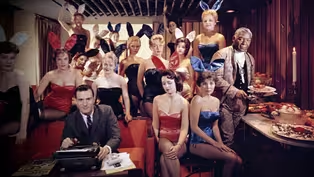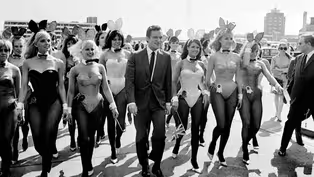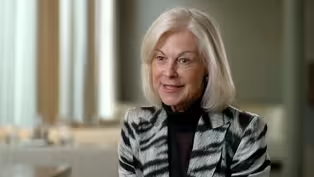Chicago Stories
Hugh Hefner and the Origins of Playboy
Clip: 10/18/2024 | 7m 4sVideo has Closed Captions
Hugh Hefner began Playboy magazine from his apartment in Chicago.
Hugh Hefner, once a shy, awkward kid, began Playboy magazine from his apartment in Chicago.
Problems playing video? | Closed Captioning Feedback
Problems playing video? | Closed Captioning Feedback
Chicago Stories is a local public television program presented by WTTW
Lead support for CHICAGO STORIES is provided by The Negaunee Foundation. Major support is provided by the Abra Prentice Foundation, Inc. and the TAWANI Foundation.
Chicago Stories
Hugh Hefner and the Origins of Playboy
Clip: 10/18/2024 | 7m 4sVideo has Closed Captions
Hugh Hefner, once a shy, awkward kid, began Playboy magazine from his apartment in Chicago.
Problems playing video? | Closed Captioning Feedback
How to Watch Chicago Stories
Chicago Stories is available to stream on pbs.org and the free PBS App, available on iPhone, Apple TV, Android TV, Android smartphones, Amazon Fire TV, Amazon Fire Tablet, Roku, Samsung Smart TV, and Vizio.
Providing Support for PBS.org
Learn Moreabout PBS online sponsorship- Playboy Magazine sprang from the dreams of a boy raised on Chicago's northwest side, back when it was mostly prairie.
Though Hugh Hefner adored his childhood, he described a home stifled by repression.
- I think my home was a classic Midwestern Methodist Puritan.
There was no drinking in my home, no swearing, and also no real show of affection or emotion of any kind in my home.
- Hefner claimed his mother wanted him to become a missionary, but he was cut from a different cloth.
- His mom said it was not a repressed household.
I can still see the pinholes in the wall.
He grew up dreaming of the Vargas girl.
- Hefner's.
Other obsession was movies playing for a quarter at the Montclair Theater - Of all the gin joints and all the towns in all the world.
She walks into mine.
- That's where the heroes were.
That's where you had the stories of standing up for what was right.
That's where he got his sense of romance.
His favorite movie was Casablanca.
- He's looking at you kid.
- Skinny and shy, Hefner was not exactly leading man material at Steinman's High School.
After a teenage crush spurned an imitation to a hayride Hefner recast himself as a cool cat.
- I kind of reinvented myself and started referring to myself as Hef instead of Hugh.
And I changed my wardrobe and I did a lot of other kinds of things to reinvent a sort of classic image of a, of a high school student.
- The aspiring cartoonist documented every detail of his life.
- Well, I think that the last couple of years of high school were the high point for me in terms of creativity.
- Hefner made corporal in the army during World War II, but hurried back to the Midwest when it ended.
He studied psychology and playwriting at the University of Illinois, Champaign on the GI Bill, and edited a campus humor magazine called Shaft.
- I added a new feature called the Coed of the Month, fully clothed, but obviously the forerunner to the Playmate of the Month.
But at that point in my life, I was very anxious to get on to whatever my life was gonna be.
I wanted to get married and and you know, find the right job.
- Still a virgin at 22, Hefner set his heart on one particular coed named Mildred Williams.
- They were both very progressive.
They were both intellectually curious.
He had a wickedly smart sense of humor, actually something he and my mom shared.
- They were engaged, but Hefner's joy was cut short when Williams confessed to an affair.
He called it one of the most devastating moments of his life.
- I think that incident created a certain weariness about women.
- They went ahead with a wedding, had a daughter, and settled into an integrated neighborhood on Chicago South Side.
- They didn't have any money, but our apartment on the south side was in a magazine feature.
You know, they had the classic wound chair, and my nursery was wallpapered with Pogo comic strips, - Hefner slogged at several publishing jobs, writing promotional copy for Esquire.
When the publisher moved the magazine to New York, the young man faced a crossroads.
- He tied his future to Chicago, to the Windy City.
- He wanted to be part of the skyline of Chicago.
He wanted to be in those lights up there.
- I started thinking very much about my life and the fact that I wanted to do something else.
And it was then that I was started thinking seriously about creating Playboy.
And the notion of Playboy was, quite frankly, to simply create a lifestyle magazine for the young urban guy, for single guys.
Because all the men's magazines after World War II were outdoor adventure books.
And I felt there was room for a different kind of men's magazine.
So I went to everybody that could think of friends, relatives, and got a few hundred dollars here, a few hundred dollars there total of 8,000.
- Playboy would modernize Esquire's, blend of fiction journalism and cartoons for a younger Midwestern audience.
A talented art director named Art Paul designed the now iconic Bunny logo in just 30 minutes.
Hefner knew his magazine was still missing something until he read about a calendar company on Chicago's west side that held the rights to a set of nude prints featuring Marilyn Monroe.
Monroe had posed a few years earlier under a pseudonym when she was a struggling actress for just 50 bucks, but her fortunes changed.
- Marilyn was the hottest new thing in Hollywood, and it came to light in all the PR around her that she had done these Cheesecake Calendar photos where as she put it, she had nothing on but the radio.
- So I drove out and I beat up Chevy, and I had a very good day, and I walked outta there with the rights to reproduce the calendar picture for $500.
- He didn't know if it was gonna be a success or not, and it sold 50,000 copies, which astounded him.
- Talk about a turnaround in your life from just feeling like completely, you know what?
What's the point?
Where am I going to riding this rocket ship?
The - 50 cent magazine flew off shelves.
Monroe didn't earn another dime.
- Hefner never asked for permission.
Her career obviously was okay, but it was in her mind another invasion.
- In an era when even talking about sex was taboo, Hefner's timing was impeccable.
- It was such a conservative decade.
It was a tremendous amount of pressure to get women back in the home.
The women had been out in the workforce during World War II, and this was really a, a post-war phenomenon.
- It was a rebellion against the conformity of Eisenhower's America, and it was sort of one of these historical situations where the right man with the right idea in the right setting all come together.
The Chicago Playboy Club and Hugh Hefner’s Mansion
Video has Closed Captions
Clip: 10/18/2024 | 7m 58s | Hefner opened the first Playboy Club, followed by his mansion, in Chicago. (7m 58s)
The End of Playboy’s Chicago Era
Video has Closed Captions
Clip: 10/18/2024 | 9m 2s | Playboy’s time in Chicago comes to a close. (9m 2s)
Extended Interview: Christie Hefner
Video has Closed Captions
Clip: 10/18/2024 | 5m 49s | Christie Hefner, Hugh Hefner’s daughter, talks about her father and Playboy’s philosophy. (5m 49s)
Providing Support for PBS.org
Learn Moreabout PBS online sponsorshipSupport for PBS provided by:
Chicago Stories is a local public television program presented by WTTW
Lead support for CHICAGO STORIES is provided by The Negaunee Foundation. Major support is provided by the Abra Prentice Foundation, Inc. and the TAWANI Foundation.


















